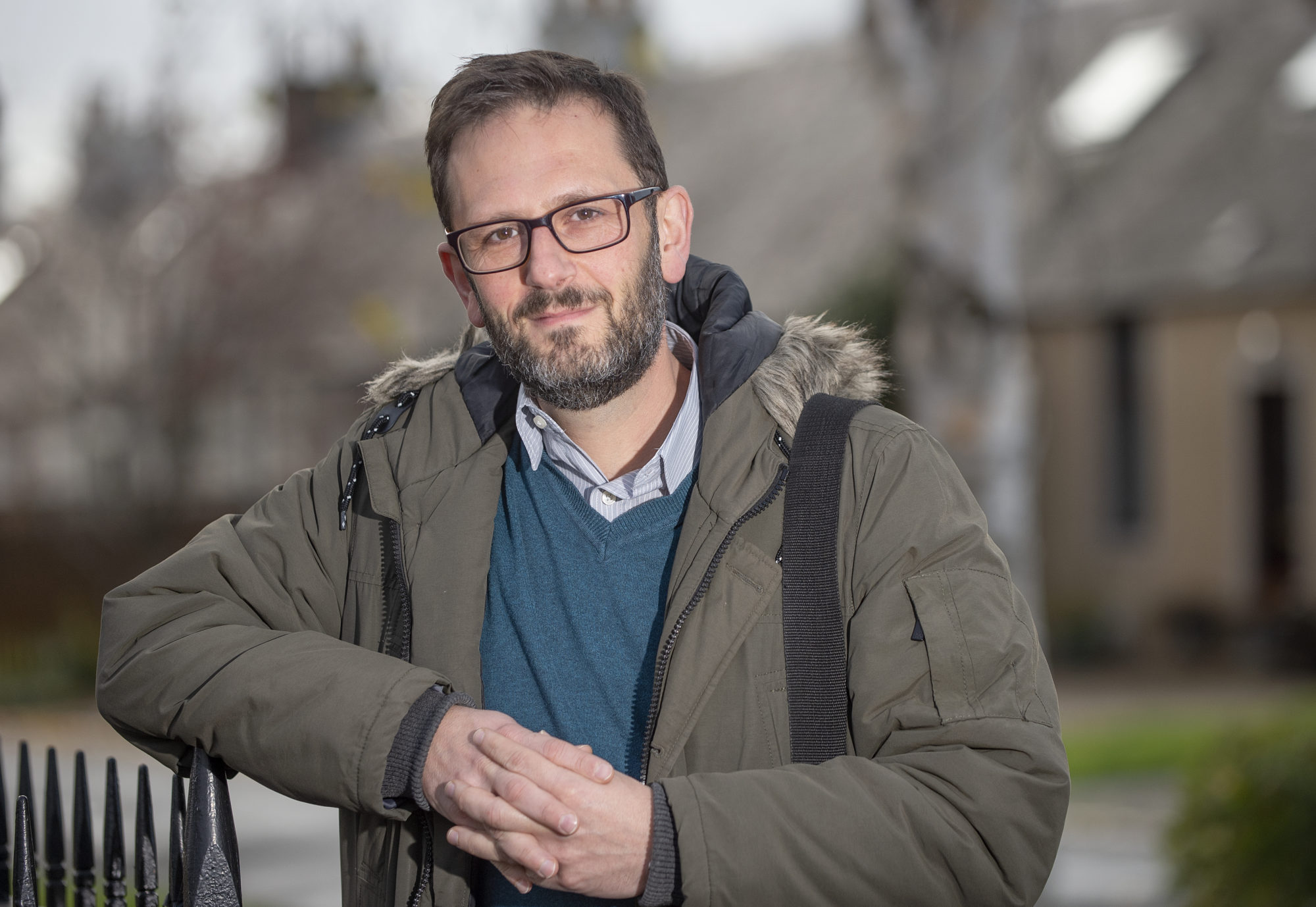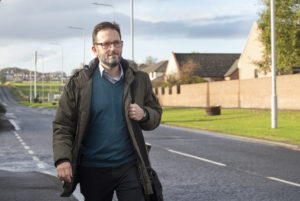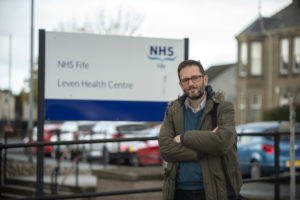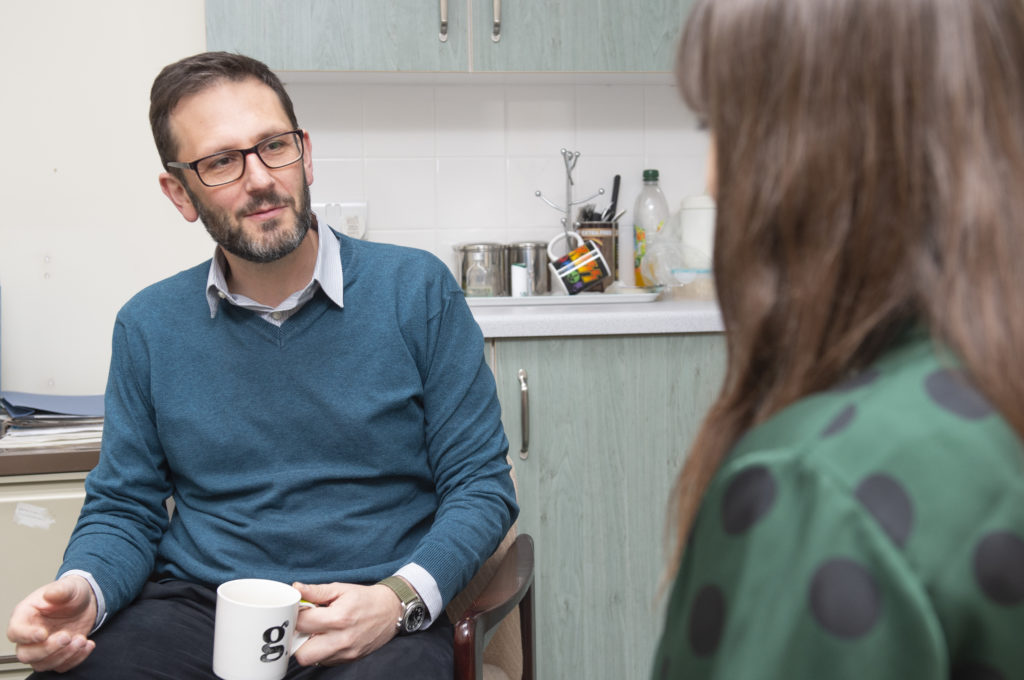Gerry Hastie

A passionate advocate for community mental health nursing, Gerry Hastie has been working in the role with NHS Fife since 2004. He is proud to be a nurse that colleagues seek out for advice and support given his broad knowledge and clinical expertise.
Leaving school, I thought I had wanted to do something in the arts and entertainment industry but I realised that wasn’t for me. I was looking for something else, and it was witnessing the care my dad received when he was ill and participating in his care that made me start to think about becoming a nurse. I had a chance encounter around that time when I bumped into an old school friend on a bus. As we were catching up, she was describing how she was a student mental health nurse and I quite liked the sound of it.
Within a couple of months of thinking about it, I was off to college in Fife where I did my initial mental health nurse training before completing a Bachelor of Nursing at the University of Dundee. I worked for a while in acute mental health admission, before moving into the addiction service at NHS Fife. I became a Community Mental Health Nurse 14 years ago, and really believe that it’s only in the community that one can truly understand the context in which a person lives and how any health problem impacts upon them.

Based in the Levenmouth area, the job is a mixture of home visits and clinic-based appointments where I carry out a holistic assessment of adults with a wide range of mental health problems.
My job is talking to people, having important conversations and it’s about having the ability to build good relationships to decide with them what is the best way to help them. As an experienced mental health nurse I bring my professional expertise to each conversation, listening attentively to what is being said and what is not being said and constantly assessing what that person needs to feels safe in order to build trust.
The great thing about community nursing is that you can actually dedicate focused time in terms of making appointments. It can be in the person’s own home, going for a walk, a clinic or a local coffee shop or a third sector mental health day centre. I have a lot of flexibility about how and where I can see people.
My practice is underpinned by a strong evidence base. I practice solution focused brief therapy and have delivered awareness-raising and training sessions on this psychological therapy and supporting colleagues in using this approach that can change lives.
 I am a clinical supervisor, enabling colleagues to embed reflection into their practice and I am working to develop an online learning module to help prepare nurses in Fife for undertaken this vital activity.
I am a clinical supervisor, enabling colleagues to embed reflection into their practice and I am working to develop an online learning module to help prepare nurses in Fife for undertaken this vital activity.
I work within a multidisciplinary team and this will involve reviewing care plans, looking at referrals on to other appropriate agencies and supporting colleagues working with others in case discussion. I also mentor student nurses at all levels on community mental health placement.
I see my job as working together to enable a person to live the best life they can even with what can be a serious ongoing mental health problem.
It’s about using clinical skills, relationship skills and knowledge of resources in the community to give that person what matters to them. That could be returning to work, or meaningful activity, or pursuing their own goals in solving their own problems. In terms of the difference I hope I make, a lot of it depends on what is important to the person in front of me.
 Being a nurse in the community helps me understand how the lived experience of an individual impacts on their health and ability to adapt – be it relationships, poverty, isolation or accessibility of resources or a combination of these factors. Nursing sees beyond the ‘diagnosis’ and interfaces with the very present and real circumstances of a person’s life.
Being a nurse in the community helps me understand how the lived experience of an individual impacts on their health and ability to adapt – be it relationships, poverty, isolation or accessibility of resources or a combination of these factors. Nursing sees beyond the ‘diagnosis’ and interfaces with the very present and real circumstances of a person’s life.
When I meet people they come with traumas; broken down relationships; fragmented families and the consequences of inequality: hopelessness, low self-esteem and challenged expectations. They also come with successes; stories of surviving against the odds; enduring the worst of humankind yet still trying to adapt to the demands of life.
I meet with people where they are at and work collaboratively to set goals that the person can achieve rather than having some normative idea of health impressed upon them.
I carry a wooden cube in my pocket and have done for a few years – it is my constant reminder that things in life need to be looked at from all sides in order to really understand. I take time to reflect and process. I like the ‘pause button’: this gives me time to ‘turn the cube’ and look at a something from a different angle.
It therefore comes as no surprise that my issue for development has changed and developed as I progressed on my journey through the programme.

The programme has given me the opportunity of really cementing my values and skills as a community nurse. I now have a deeper understanding of the expertise of nurses in supporting people’s health and wellbeing as individuals and in influencing how services are shaped and delivered.
The focus on the person-centred framework throughout the programme was like a light bulb going off in my head. Meeting Dr Margaret Hannah who was the Consultant/Director of NHS Fife Public Health (now retired) who came to speak with us at the first residential was an equally revelatory moment that inspired me to combine the ideas of person-centredness and personal outcomes as my issue for development.
This has involved developing a deeper understanding of these concepts. I have been meeting with the team working on Personal Outcomes in NHS Fife and undertaking their training programme called Good Conversations which has all the hallmarks of focusing on more person-centred approaches; not just in direct patient care but in the culture of services.
Extending into the future I will be undertaking the Facilitating Personal Outcomes and Good Conversations training for trainers and introducing this within adult community mental health services in Fife. My vision is that community mental health nursing in Fife really takes on the values of person-centredness in working with people and promoting recovery working with what matters to people not just what is the matter with them.